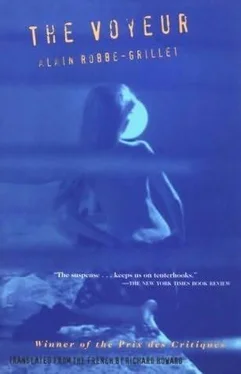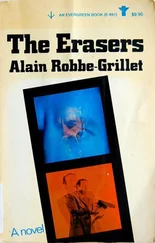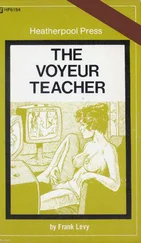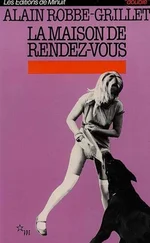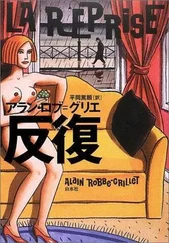Mathias also took into account his own bizarre position at the moment; he would have to furnish some explanation for that. He estimated the distance separating him from the cliff top. The silhouette against the sky frightened him all over again. He had almost forgotten its immediacy.
Julian watched him in silence with the same fixed eyes, thin lips, frozen features.
“Hey! Hello there, boy!” Mathias cried, pretending surprise, as if he had only then discovered his presence.
But the boy did not answer. He was wearing an old jacket over his work-clothes, and a cap that made him look older—at least eighteen. His face was thin, pale, and rather ominous.
“They thought I was throwing them a fish,” the salesman said, pointing to the gulls spiraling over their heads. And he added, embarrassed by the persistent silence: “It was an old rag.”
As he spoke he looked hard at the water moving under the parallel lines of foam between each wave. Nothing returned to the surface…
“A sweater.”
The voice came from above, neutral, smooth, unchallengeable—the same voice which had said: “Before leaving you took a key out of a little bag fastened to the seat…” The salesman turned to face Julian. The latter’s attitude and expression, or rather lack of expression, were exactly the same. It was as if he had never opened his mouth. “A sweater?” Had Mathias heard right? Had he heard anything?
Considering this distance of seven or eight yards, considering the noise of the wind and the waves (even though they were not so strong today), he could still manage to pretend he had not understood. His eyes swept over the gray wall again, examined the humps and hollows, then stopped in an indentation protected against the eddying waves, where the water level rose and fell more markedly along the polished surface of the rock.
“An old rag,” he said, “I found it here.”
“A sweater,” corrected the voice of the imperturbable onlooker.
Although not shouting, he had spoken more loudly. No doubt remained. The same elements were repeated: the eyes raised toward the top of the cliff, the body leaning forward, the motionless face, the closed mouth. With a movement of his hand, Mathias specified: “Here, on the rocks.”
“I know. It was there yesterday,” the young man answered. And when Mathias had lowered his eyes: “It was Jackie’s.”
This time the salesman decided on an obvious interruption to give himself time to understand what was happening and to determine what line to take. He began climbing up the rocky slope by the same path he had taken down. It was much easier than the descent; he reached the top almost immediately.
But once on the moor at the cliff edge, he was still not certain what would be best to do. He walked as slowly as possible across the short distance still separating him from Julian Marek. What did he need to think about? Actually he had merely retreated before the threat, hoping, perhaps, that the other would say something more of his own accord.
Since the boy, on the contrary, maintained an obstinate silence, the salesman’s first concern was to put his duffle coat back on. He thrust his hands into the pockets to check their contents. Nothing was missing.
“Smoke?” he asked, holding out the open pack of cigarettes.
Julian shook his head and stepped back. The salesman replaced the blue pack in his pocket, where his hand came in contact with the little cellophane bag.
“Would you like a gumdrop?” He held out the transparent bag filled with multicolored twists of paper.
The frozen face was already beginning to make the same sign of refusal, when the features underwent an almost imperceptible modification. Julian appeared to be changing his mind. He looked at the bag, then at the salesman, then at the bag again. It was at that moment that Mathias realized what was so extraordinary about his eyes: they expressed neither effrontery nor hostility, they were merely a little strabismic. The discovery reassured him.
Besides, Julian—now interested—was walking toward him to take a gumdrop out of the bag. Instead of taking the one on top, he pushed his fingers farther in, to grasp the twist of red paper he had decided on. He looked at it attentively, without unwrapping it. Then he looked at Mathias…. There was certainly some flaw in the young man’s vision, yet he did not squint. It was something else…. Extreme myopia? No, he was holding the gumdrop at a normal distance from his eyes.
“Well, go on and eat it!” the salesman said, laughing at Julian’s hesitation. Perhaps he was merely a little simple-minded.
The boy unbuttoned his jacket to reach one of the pockets in his work-clothes. Mathias thought he wanted to keep the tidbit for later.
“Here,” he said, “take the whole bag.”
“It’s not worth it,” Julian answered. And he stared again…. Could it have been a glass eye that made his stare so embarrassing?
“Is this yours?” the boy asked.
Mathias glanced from his eyes to his hands: the right one still held the wrapped gumdrop, and in the left, between thumb and forefinger, was an identical piece of red paper—shiny, translucent, crumpled—but untwisted and empty.
“It was here in the grass,” Julian continued, with a movement of his head to indicate the little hollow beside them. “Is it yours?”
“Maybe I dropped it on the way,” said the salesman, feigning indifference. He realized at once that gumdrop wrappers are not “dropped,” but thrown away. To disguise his error he added, as agreeably as he could, “You can keep it too, if you like.” “It’s not worth it,” Julian answered.
The same quick smile he had noticed at the farm passed across the boy’s thin lips. He wadded the rectangle of red paper into a hard ball and flicked it into the sea. Mathias followed its trajectory, but lost sight of it before it had reached the bottom of the cliff.
“What made you think it was mine?”
“It’s just like those.”
“What does that prove? I bought them in town. Anyone else could have bought them. Violet must have been eating them while she was tending the sheep…”
“Who is Violet?”
“I mean poor little Jacqueline Leduc. You’re mixing me up with all your nonsense!”
The boy said nothing for several seconds. Mathias took advantage of the time to let his face become pleasant and peaceful again, a task he had not taken enough trouble with during the last few remarks. Julian took the gumdrop out of its wrapper and put it in his mouth; then he spat it out into his hand, wrapped the paper around it, and threw it into the sea.
“Jackie always bought caramels,” he said afterward.
“Well, then it was someone else.”
“At first you said it was you.”
“Yes, it was. I took one just now, on the way here, and I threw the paper away. You’re confusing me with your questions.”
The salesman was talking naturally now, even cordially, as if he understood none of the reasons for this interrogation, but was nevertheless yielding to his interlocutor’s childish caprices. One of the gulls plunged, then gained altitude with great strokes of its wings, almost grazing the two men as it passed them.
“I found it yesterday,” Julian said.
Mathias, not knowing what to answer now, was on the point of walking away from young Marek with all the abruptness of justified impatience. Yet he remained where he was. Although it was impossible to prove anything by this one piece of red paper, it would be better not to alienate so persistent an investigator, one who might be acquainted with other elements of the story. But which ones?
There was already the episode of the gray sweater. Julian might also have discovered a second gumdrop wrapper—the green one—and the third half-smoked cigarette…. What else? The question of his presence at the farm at the time of the salesman’s supposed visit also remained to be cleared up. Actually, if the boy had happened to be in the courtyard or the shed that morning, why had he not told his father that no one had knocked at the door? What was his motive in backing up Mathias’ story? And if he had been somewhere else, why did he behave in such a strange way about it? After his long, stubborn silence, why this preposterous last-minute invention of a repair made to the bicycle gearshift?… A bolt tightened?… Perhaps that was the solution to all these incidents, now that he had come full circuit.
Читать дальше
